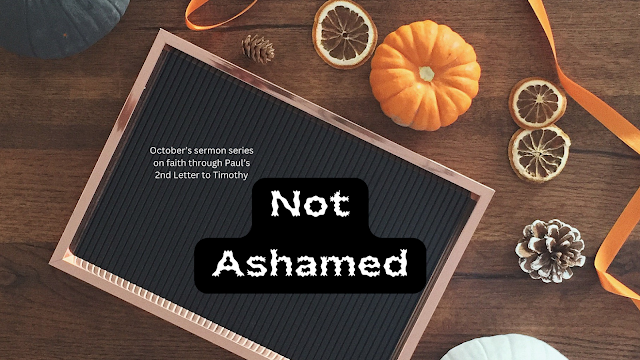Overcoming Babel - Acts 2:1-21 (Pentecost C)
The Bible is full of big stories, and how they can get done through what God can do. From Noah and the ark, Joseph and his ability to decipher dreams, to Daniel in the lions' den; God is capable of doing amazing things.
Pentecost is one of these stories. Let me set up the scene, Jesus had just died and before his ascension to heaven, told the disciples - stay in Jerusalem until they receive "the gift that the Father promised", and that soon they will be "baptized with the Holy Spirit", in chapter 1 of Acts.
Since they were followers of Jesus, they decided to wait. It may have been like hunkering down at the beginning of our pandemic. They knew something awesome was going to happen, they just couldn't know WHEN it would. We don't know what time of year it is when Jesus tells them to wait, but we know now that is the time of Pentecost.
Pentecost is also known as "the Festival of Weeks" because it happens fifty days, or approximately seven weeks after Passover on the Jewish calendar. The Jewish name is Shavuot, and it is still practiced to this day. It's a celebration of the spring wheat harvest - you know they weren't in northeast Indiana or something - and also doubly celebrating the giving of the law to Moses on Mount Sinai. This is recorded in the book of Deuteronomy if you want to go back and read it on your own time.
Everyone was included in the celebration - Deut. 16:11, "“you, your sons, your daughters, your male and female servants, the Levites who live in your cities, the immigrants, the orphans, and the widows”.
But the gift for those in the time of Moses was that God gave the gift of the Torah (which united the Israelite people as a holy nation), but now at the time of the Book of Acts, God also gave the gift of the Spirit, uniting all people in inclusive to be blessings to all people.
So getting into the reading from Ken today, we start with kind of a weird opening, where it leaves an undefined "they" in the first sentence. Well - who were they? In the previous chapter, the disciples were coming together to choose a new twelfth disciples, after you know, Judas. It turns out it was this guy named Matthias. So I don't know if it was just the 12 disciples, or if the women who were referenced in verse 14, like Mary the mother of Jesus, among others.
But then all of a sudden, God shows up. Like in many other tellings of God's actual presence, He makes it known that he is there. Visual and auditory manifestations, like at Jesus' baptism (recall: "This is my son, with whom I am well pleased"). Even the Greek word PNEUMA means both wind and spirit. This also connects the New Testament to the Old Testament through the idea on Mount Sinai, when the Ten Commandments were given to Moses, there were earthquakes and fire in the days before.
Imagine the scene though, this cacophany of sound and excitement, then with tongues of fire. Then, in verse 4, they were filled with the Holy Spirit. As much as this chaotic scene doesn't seem very comforting, think about being filled with the Holy Spirit amongst all this drama, and the peace that may have been received. Luke, who wrote this book along with his gospel, during the stories of Jesus' infancy, all the characters are filled with the Spirit as well - John the Baptist, Mary, Elizabeth, Simeon. But once he starts his ministry, only he is said to be empowered by the Holy Spirit. NOW, his followers are given this gift. How amazing, right?
So then the focus shifts. There's this giant festival going on in Jerusalem.. the harvest, remember? People have come from all over the known world to attend. Much like today, Jerusalem has always been an international city of many flavors, if you will. It's kind of amazing that even the Jewish people from so far away are there to witness and go back to their lands to share what they saw.
But the text finishes the section with... well - what does it mean? And I think we are still trying to figure that out all these many years later, although, we know for certain that these people were not drunk.
Imagine the liberation they must have felt when the Holy Spirit came through them - liberated at the chaos of creation, liberation from oppression through the ages, whether it was from Babylon or Rome. What do you think the modern believers needs to be liberated from? Church structures? Consumerism? Self-importance?
Before that, back in the earliest days, in the book of Genesis, It was so clear and unifying before, before the clouds of uncertainty rolled back in, before the distractions of a complicated world jumbled the message. It was as if all of a sudden everyone started speaking a different language.
Well, let me tell you a story. It always seemed fanciful to some, one of those Old Testament stories that borders on the mythological. Too grand for us to comprehend. And besides, it was obviously there as an “explanation” story. Like many of the ancient myths, this story was there to explain the reasons behind the way the world was. “Why,” someone wondered, “are there so many different languages and cultures in the world?”
You know the story: the babbling story; the tower and the languages and the scattering and the sin. Except, it is sometimes hard to see the sin. It seems as if God picks a fight. I know, I’ve heard the explanations. They were thumbing their noses at God. Well, maybe. Though there isn’t a real clear taunt against the divine powers in this all too brief story.
What if... the story of Pentecost was the reversal of the story of the Tower of Babel from Genesis 11?
Now, this is something that would tie together the Old and New Testaments. The fire of the God's Holy Spirit coming from Mount Sinai through Jesus to be living in each of His people. The disciples break out into all sorts of different languages, but it's said in verse 4 that the Spirit gave them the ability to understand the others. Was it just for the day? Was it for the rest of their lives? We don't know. But, again, the people witnessing this miracle would be talking about it in their lives they return to after the great festival.
This isn't about making people great, like Babel was. It's about making God great. The focus of those in Genesis was finding a way, kind of like Adam and Eve, to find a way to be at the same level of God. The reversal of the self-centeredness of Babel and the focus on declaring the Good News of God’s great deeds of power in Jerusalem, Judea, Samaria and to all the ends of the Earth
Community for its own sake is not always a good thing - having a spirit-filled community with their eyes on God is transformative. This Pentecost experience may be understood as inverting God's concern regarding the ancient peoples into a divine promise for a newborn church: "Genesis 11:6 says, "This is only the beginning of what they will do; nothing that they propose to do will now be impossible for them".
But what does it mean?
This is a pretty memorable text to read from. Since it's been important to the church since the beginning, there's a high likelihood that you've heard a sermon about it before. So - I am hopefully putting this is in a new way, bringing fresh eyes to this scripture.
Have you had a moment where you were so deliriously in the Spirit or even joyous that people mistaken you were drunk? I've been accused of that in my life. But it really comes back to the Spirit that's within me. I've always been kind of happy-go-lucky, especially in my early school days. On our graduation day, one of my classmates came up to me and said that the thing he would remember about me was in elementary school I was so friendly and bubbly. I would skip down the hallway and just say hello to anyone who was there, carefree. I can totally see my children emulating that. Needless to say, that's not something you want to hear from one of your 18 year old classmates, but looking back, it checks out. In high school, I had a tshirt that I thought summed up my personality in two words: "Easily Amused". I have this amazing picture of me at 16, I think, where I'm sitting cross-legged and popping up with two peace signs in each of my hands, laughing. It almost looks like I could have been a hippie in a different era, but I was experiencing that through the mid-90s, when life was different than it is now. I'm not sure if it was an air of confidence that I had at the time, or that I didn't take myself too seriously when asked questions because for my responses, I sometimes got that response. People looked at me like I'm drunk, or just out of my mind. I'd like to think that the Holy Spirit was preparing me.
To finish up, we need to talk about Peter's response to the accusation of being "filled with wine": he comes up with scripture of all things, from the Prophet Joel, who has his own book in the Old Testament, this comes from chapter 2 verses 28-32. Peter interprets the Spirit descending from heaven as an start of last days, marked by prophecy and cosmic signs. The section from Joel is part of a bigger section of the Restoration of the nation of Judah, that at some future time God will outpour his vital force breaking barriers separating society. Distinctions between age, gender, and social class will disappear during this event that Joel prophesies. Peter finishes with "EVERYONE who calls on the name of the Lord shall be saved."
This is what they witnessed. We started being witnesses on Easter, seeing the power of Christ on the cross, and then overcoming death itself. May we remember all the stops we have made on the way from there, to this Pentecost day - that these two days are mirrors, and that we cannot really sustain one without the other. Pentecost without the Holy Spirit is just like telling the story of Jesus Christ, but thanks to God's power coming down to work through us, we know what it's like to live in Jesus Christ.
Let me tell you how well that worked out. God not only destroyed the tower, not only dispersed the crowd of builders to the ends of the earth, speaking in in languages they didn’t understand.
Even at that time, though, what the babblers thought that God was angry, or that they did something wrong may have only been partially true. God still loved us, but we were missing the point! It wasn’t that we needed to come up to where God was, it was that we needed to live as though God is already here. The Holy Spirit came to envelop each of the believers and lead them as though Jesus lived within each one of them.
We have gone through this Easter season, which now ends with the celebration this morning at Pentecost, declaring that we are witnesses to the risen Christ, to the indwelling of the Holy Spirit in each one of us. How are we going to declare our witness to the world? Is our church flexible enough to see where the Holy Spirit leading, or are we going to try to direct that Spirit to the backseat?
Let me end with a a word of prayer:
Dearest Lord, may we be noise makers - not to be dull gongs or tinny trumpets, but to be letting the spirit lead us where people need hope and justice and love. May we draw people together, and not separate. We proclaim your great works among us, and that your words stay in our hearts for all time. Amen.




Comments
Post a Comment